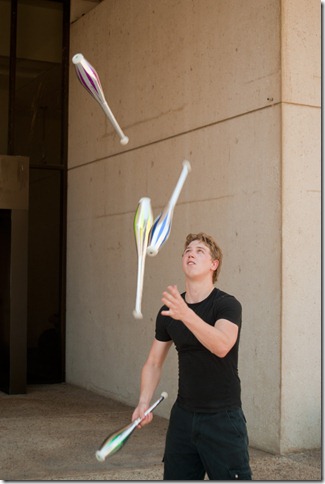If you have ever looked at a piece of fruit and thought its best use may be something other than sustenance, if you have ever stood in a corner for over an hour as a means of enjoyment, or if you have ever pondered the meaning of life whilst absent-mindedly throwing objects from one hand to another, then you might be a juggler.
Don’t worry: you’re not alone.
Millions of people the world over take satisfaction in their pursuit of throwing various objects from one hand to the other.
But why?
What kind of a person with any measure of appreciable mental aptitude would spend hundreds — if not thousands — of hours in the pursuit of a skill with no immediately obvious practical application?
I do.
No, I’m not a resident at one of those facilities intended to keep the abnormal from harming your children. Nor am I the person you may have seen sitting on a street corner with pan in hand and a sad expression.
I am a juggler.
Sometimes people watch from afar, a look of bemused confusion on their face. The brave will occasionally shout out words of encouragement or admiration, but the truly interested approach me and ask “how do you do that?” The answer is simple; practice and a lot of it. But, here’s the catch, it’s easy!
I know there are more than a few people out there thinking, “Oh, I could never do that. I’m just not coordinated enough.”
With all due respect, you’re wrong.
Anyone capable of moving an object through space with any degree of control can learn to juggle. So now that we’ve gotten that out of the way, let’s move on to the more interesting side of juggling: why do it?
If you asked one hundred jugglers why they do it, you would likely get one hundred different responses. I can tell you why I juggle, and why you should give it a shot as well, but first, let me tell you a bit about how I found myself hooked on the art of throwing things up in the air and catching them again.
My introduction to juggling came from the somewhat unlikely and almost entirely unrelated sport of badminton. Every Saturday morning I would travel to gymnasiums all over my hometown of Adelaide, South Australia, to test my abilities against like-minded middle school students in the act of violently slamming a shuttlecock over a net. I certainly can’t speak for everyone, but all I can really remember was an overwhelming sense of boredom.
Badminton wasn’t my cup of tea, but somehow spinning, throwing, and twirling a badminton racket through the air cured my mind of boredom when waiting between matches. I enjoyed it so much that I started doing it at practice and at home. My coaches were not pleased.
It wasn’t until seven years later that my juggling coach at the National Institute of Circus Arts in Melbourne, Victoria told me that the contemporary art of club juggling (think bowling pins) actually arose from performers doing exactly the same thing with wooden tennis rackets. The primary difference of course being that they would throw three, four, sometimes five rackets from hand to hand at the same time!
So what are some of the benefits of juggling? Other than fitness and the development of hand-eye coordination there are three primary reasons to learn to juggle.
First, juggling is a very social activity. Due to the fact that juggling, for the most part, is non-competitive, people of all skill levels can juggle together and teach each other new tricks. Once a person gets the basics of club juggling down, he or she can then attempt pass juggling: an activity in which clubs are passed between two or more people in a steady rhythm.
Second, juggling promotes brain plasticity. Studies have shown that individuals who learn to juggle actually improve the efficiency of their motor cortex. This can help to reduce the degradation of neurons with aging.
Finally, juggling requires a particular type of concentration that can completely block out other thoughts. It forces a kind of focused meditation. The brain is so occupied with the task of getting balls one, two, and three from one hand to another that it is left with no time to ruminate on anything else. This can be incredibly useful for getting away from the stress of work, school, exams, and other aspects of life that tend to dominate our thinking from time to time.
With all this in mind, there is very little argument against learning to juggle, unless of course you can honestly say that you spend little to no time engaging in anything other than obligations to other aspects of your life. The next time you find yourself thinking about what movie to watch or what game to play, pick up a couple of tennis balls and give it a shot. I have no doubt you’ll be surprised by how fast and rewarding you will find learning to juggle can be.
Good luck!
Contributed by Josh Moncrieff
Photographed by Alex Chi




Recent Comments